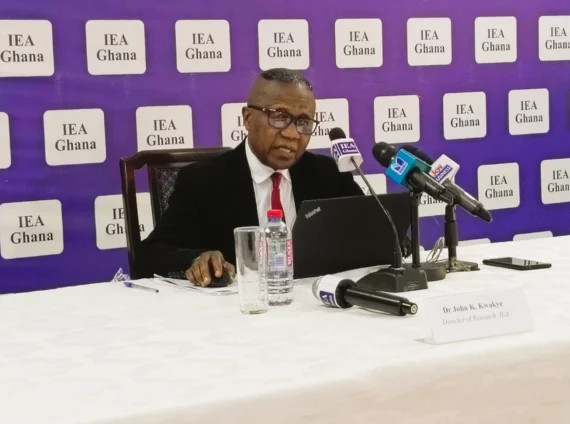The Institute of Economic Affairs (IEA) says it is time for Ghana to take ownership of its natural resource wealth to derive more benefits for the nation..
Dr. John K. Kwakye, Director of Research at IEA Ghana, said this during a press briefing on Wednesday to present the Institute’s reflections on President Akufo-Addo’s State of the Nation Address (SONA) on February 27 and the Monetary Policy Committee (MPC) Decision delivered by the Bank of Ghana Governor on March 25.
During the SONA, President Akufo-Addo praised Ghana for recovering its position as Africa’s largest gold producer, surpassing South Africa with gold production of four million ounces.
Dr Kwakye responded: “Taking Ghana’s reported annual production of four million ounces and multiplying by the current world price of US$2,200 per ounce gives US$8.8 billion. The question is, how much of this belongs to Ghana? Ghana’s share is not likely to exceed 20 per cent, or about US$1.8 billion, while the much bigger share of about US$7.0 billion goes to foreign companies.”
President Akufo-Addo also spoke about the development of a local gold refinery to increase the value of the commodity.
The Institute said the policy was long overdue and suggested that it be extended to all the country’s natural and agricultural commodities.
“We should construct cocoa processing factories and refineries for oil, bauxite, lithium, etc., to take advantage of the vast difference between the prices of the refined products and the raw commodities,” Dr Kwakye said.
The President again noted that the Domestic Debt Exchange Programme (DDEP) had made considerable progress.
Dr Kwakye commented on this, saying, “We should not lose sight of the immense hardship the DDEP has brought on bond holders, including pensioners and the financial sector, which was heavily exposed to Government debt. Even BoG was not spared the adversity.”
The Institute reiterated that Parliament should impose a debt ceiling of 60 per cent of GDP in the Fiscal Responsibility Act, in addition to the existing deficit ceiling, to ensure long-term debt sustainability.
Regarding taxes, the IEA noted that the government was elected on the premise of moving from taxation to production.
However, the Government had done the opposite, with the country experiencing “proliferation of taxes”.
The Institute contended that taxes including the E-levy, COVID-19 Levy, Growth and Sustainability Levy, Sanitation Levy, the failed Emissions Levy, Betting Levy, and VAT on power consumption were “multiple, nuisance or outdated taxes” that could not be justified.
The Institute pointed out that the government did not make an equal effort to reduce its expenditure, despite its size and multiple flagship initiatives.
“The fiscal consolidation being implemented under the IMF program has to be even handed; it must fall equally on expenditure and not just taxes,” Dr Kwakye emphasised.
Latest Stories
-
Police arrest 3 over gold robbery at Wassa Afransie
34 minutes -
Against all odds: Zinabu Issah clinches silver for Ghana at WPA Marrakech 2025
1 hour -
ASFC 2025: Ghana girls complete host-and-win mission after beating Uganda
2 hours -
NPC President congratulates new GOC Executives
2 hours -
Stonebwoy displays maturity amid Aisha Modi’s attacks: a masterclass in brand integrity and respect
2 hours -
Afro-Arab Group CEO commends Kwahu Business Forum
2 hours -
CAF President Motsepe vows action against rising stadium violence
2 hours -
You’ll be prioritised for jobs in next NPP government – Bawumia to dismissed workers
3 hours -
Lola Hair and Beauty College officially launched to promote TVET
3 hours -
Minority condemns sacking of TTH CEO, demands Mahama reprimand Health Minister
3 hours -
Extraordinary photos from the funeral of Pope Francis
3 hours -
Pope Francis laid to rest after Vatican funeral service
4 hours -
Our polling station executives and grassroots are our greatest assets, I thank them – Bawumia
4 hours -
Trump questions Putin’s intentions after meeting with Zelensky ahead of Pope’s funeral
4 hours -
IACG targets 1,000 market traders and artisans in Western, Western North Regions as part 2025 Micro Business Clinics
4 hours

